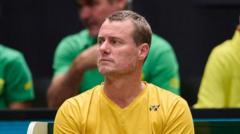Why Did Hewitt Get a Two-Week Ban for Pushing a Doping Official?

Published: 2025-09-10 12:48:05 | Category: sport
Former tennis star Lleyton Hewitt, who concluded his singles career in January 2016, has been handed a two-week ban and fined £14,600 after a serious incident involving a doping control official. Following a Davis Cup semi-final loss in November 2022, Hewitt reportedly pushed a 60-year-old volunteer anti-doping chaperone, leading to charges of offensive conduct. The Independent Tribunal confirmed the charge, stating that Hewitt's actions exceeded acceptable limits and did not qualify as self-defence.
Last updated: 20 October 2023 (BST)
Key Takeaways
- Lleyton Hewitt received a two-week ban and a £14,600 fine for pushing a doping control official.
- The incident occurred after a Davis Cup match against Italy in November 2022.
- The Independent Tribunal found Hewitt's actions excessive and not justified as self-defence.
- He can still captain the Australian team in upcoming Davis Cup qualifiers before the ban is enforced.
- Hewitt has the option to appeal the decision, although no appeal has been submitted yet.
Background on Lleyton Hewitt
Lleyton Hewitt, one of Australia's most celebrated tennis players, enjoyed a prolific career, winning two Grand Slam titles: the US Open in 2001 and Wimbledon in 2002. A former world No. 1, Hewitt retired from singles competition in January 2016 but remained active in the sport, taking on the role of Davis Cup captain. His leadership has been instrumental in fostering a competitive environment for Australian tennis.
The Incident: What Happened?
The incident in question took place in November 2022 after Australia's Davis Cup semi-final defeat to Italy in Malaga, Spain. Following the match, Hewitt confronted a volunteer anti-doping chaperone, pushing the 60-year-old official. This behaviour raised significant concerns regarding player conduct and the treatment of anti-doping personnel within the sport.
Charges and Tribunal Findings
In January 2023, the International Tennis Integrity Agency (ITIA) charged Hewitt with engaging in offensive conduct towards the doping control official. Hewitt firmly denied these charges, claiming his actions were a form of self-defence. He argued that he felt threatened in the situation, leading to his reaction.
However, the ITIA conducted a thorough investigation, reviewing video evidence, witness statements, and conducting interviews. Ultimately, an independent tribunal upheld the charges against Hewitt. The chair of the tribunal, Michael Heron, stated that the push was "too strong or forceful and was excessive or disproportionate." This ruling underscores the expectation that players maintain professionalism and respect towards officials, particularly those involved in anti-doping efforts.
The Consequences of Hewitt's Actions
As a result of the tribunal's findings, Hewitt has been banned from all tennis-related activities from 24 September until 7 October 2023. This suspension coincides with a critical period for the Australian Davis Cup team, as they prepare to face Belgium in the second round of qualifiers on 13-14 September in Sydney. The tribunal aimed to ensure that the suspension did not unduly disrupt Hewitt's responsibilities as captain during this important event.
The Importance of Anti-Doping in Tennis
The ITIA's CEO, Karen Moorhouse, emphasised the vital role anti-doping personnel play in maintaining the integrity of tennis. She stated, "Anti-doping personnel play a fundamental role behind the scenes in upholding the integrity of tennis and they should be able to go about their roles without fear of physical contact." This incident highlights the ongoing challenges faced by the sport in ensuring that all personnel are treated with respect and professionalism.
What Happens Next?
Hewitt has the option to appeal the tribunal's decision. However, as of now, no appeal has been filed. Should he choose to contest the ruling, it could lead to further examination of the incident and its implications for both his career and the broader tennis community.
The implications of this incident extend beyond Hewitt himself. It raises important questions about player behaviour, the treatment of officials, and the ongoing efforts to uphold the integrity of the sport. The tennis community will be watching closely to see how this situation develops and what it means for the future of anti-doping regulations.
Conclusion
While Lleyton Hewitt's legacy in tennis remains significant, this recent incident serves as a reminder of the responsibilities athletes have, not just to their sport, but to the officials who help maintain its integrity. As the tennis world navigates the complexities of player conduct, the focus must remain on fostering a respectful and fair environment for all involved.
As this situation unfolds, one must consider: how can the tennis community better protect its officials while ensuring fair play? #TennisIntegrity #LleytonHewitt #DopingControl
FAQs
What was Lleyton Hewitt banned for?
Lleyton Hewitt was banned for pushing a doping control official after a Davis Cup match. He received a two-week ban and a fine of £14,600 for his actions.
Can Hewitt appeal the tribunal's decision?
Yes, Hewitt has the option to appeal the tribunal's decision. However, as of now, no appeal has been submitted.
When is Hewitt's ban effective?
The ban is effective from 24 September until 7 October 2023. He will still be able to participate in the Davis Cup qualifiers against Belgium on 13-14 September.
Why is anti-doping important in tennis?
Anti-doping is crucial in tennis to ensure fair competition and maintain the integrity of the sport. It protects athletes' health and promotes a level playing field.
What did the tribunal say about Hewitt's actions?
The tribunal stated that Hewitt's actions were excessive and did not meet the requirements of self-defence, highlighting the need for players to respect officials.



